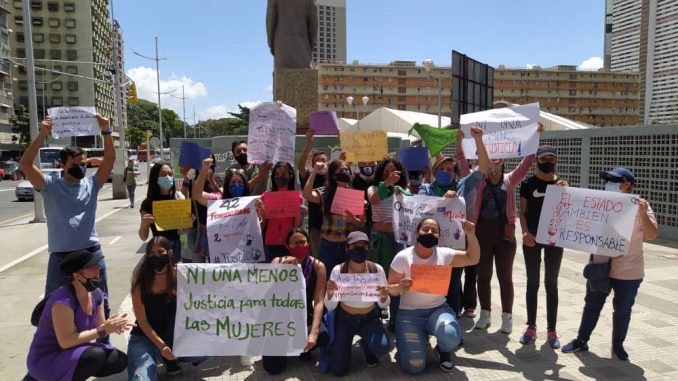
One of the scourges the world is going through is femicides. In Venezuela, just like in many countries, it has been denounced that violence against women increases due to the lockdown of Covid-19, the severe economic and social crisis and the anti-rights attack by sectors of the Church against the fundamental rights of women, contradicting the secular nature of the State.
The absence of official numbers shows the null disposition of the government of having policy targeted at eradicating gender-based violence. Beyond the reform to the Ley Orgánica on the rights of Women to have a Life Free of Violence, in 2014, its enforceability is deficient. The conservative and reactionary nature of the religious sectors that were given a rude opening and strength by the National Assembly imprint a psycho-social reinforcement on the stereotype of the woman-object and the couple relations from a macho and patriarchal perspective.
Some feminist activists and organizations have developed a work of information and dissemination of femicide figures based on the records reported in the media or on social networks.
For example, in 2020, 256 femicides took place in Venezuela. This detailed record of each murder of women has made it possible to visualize these facts. Femicides came out of the closet, the myth that in Venezuela the murders of women for the mere fact of being women were almost nonexistent, or isolated cases, was demolished. Today thanks to this effort we have been able to shed light on this issue, raise awareness and it has allowed us to go out with strength to demand #JusticiaParaTodasLasMujeres (#JusticeForAllWomen).
In the first quarter of the year there have been 44 femicides. If in 2021 the dantesque figure averaged the murder of a woman every 33 hours. In the first two months of the year 2021 there have been 44 femicides in only 58 days, the majority occurring at the hands of the victims’ partners or ex-partners, followed by deaths caused by rape.
The cases of three women murdered in the Portuguesa state in less than 48 hours, two of them: Eliannys Andreína Martínez Roñoz (17) and Eduarlys Falcón (20), were kidnapped, raped, mutilated and murdered. Simultaneously, Carmine Sosa was murdered. These cases set off alarms and outrage. Protests in the same state of Portuguesa did not cease for three days and were joined by voices from the states of Merida, Aragua and Caracas.
In Caracas, Juntas y a la Izquierda together with several feminist organizations and activists held a concentration, a picket-protest in what we have called the Feminist Wall in Bellas Artes. There we met with our rage and indignation to the cry of #NiUnaMenos #VivasNosQueremos and to the demand justice we marched against violence.
On the afternoon of February 27, the news was not long in coming, the Attorney General’s Office announced through the networks the arrest of the “Monster of Turén”, Nelson Antonio Torrealba Saavedra, who had been reported by his partner. Beyond the imprisonment of this sexual predator, the cry for justice does not end, because women are being murdered without an effective policy to end gender violence.
They are femicides. The State is responsible
The official propaganda of the feminist nature of the government is as false as the worker nature it attributes itself. In the context of gender violence, prevention makes the difference between life and death and it is precisely the continued omissions in this matter by the State that makes it responsible for the femicides that have occurred in Venezuela.
The Venezuelan State has been extremely superficial and propagandistic with the issue of gender violence. The necessary prevention to avoid the murder of women has been the great absentee. There are no concrete actions from the State to protect the victims.
The murders of women in contexts of gender violence show that the right of women to a life free of violence is not guaranteed and deserves much more than a law.
How many lives would have been saved if the public prosecutor’s office and the competent authorities had acted effectively instead of re-victimizing the woman making the complaint? Why are no protection measures and effective accompaniment offered to women who suffer gender-based violence? How are women who suffer from battered women’s syndrome and are reluctant to report their aggressors supported and protected? Where and in what conditions are the shelters? What is the budget for the prevention of gender violence? What are the consequences of the prevailing impunity in cases of violence against women? How does the deep precariousness in which women find themselves, together with the rest of the workers, influence the continuous destruction of their wages and living conditions?
From Juntas y a la Izquierda we invite you to join us to fight against the scourge of continued violations of our rights. Against gender violence and femicides. In the face of the macho and patriarchal offensive our best weapon is organization and struggle.








